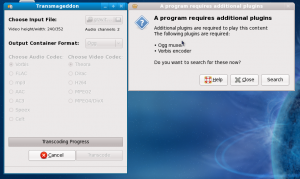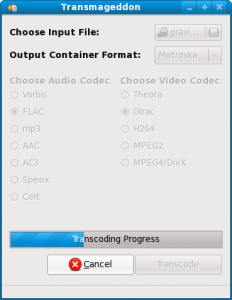Did a new Transmageddon release today. This version includes the first stab at the device profiles support that I have been working on in collaboration with Daniel of Arista transcoder fame. While I think most of the profiles in there work many of them are probably not optimal as I haven’t gotten around to testing them as much as I wanted. Getting the Nokia 770 profile going basically sucked up all time I had for Transmageddon over the last weeks.
Be also aware that the presets might not work as expected as they rely on still unrelased changes to GStreamer. So while I put in checks in the code for this, it means that if it doesn’t find the GStreamer preset support, it will just go with encoder defaults, which will not work for some devices, most notably the iPod.
There are a couple of features on my immediate TODO list atm, which include multi pass encoding and remuxing, in addition to cleaning up the website, but things are looking a little hectic for a while, so I figured I get this release out as it might be quite some time until I get around to sorting out those issues.
I also got a Bugzilla entry set up for Transmageddon now, so feel free to file bugs and enhancement requests. But please be aware of the bleeding edge development goals of Transmageddon, which do mean your out-of-the-box GStreamer will probably not give you access to all the full featureset of Transmageddon.
So enjoy Transmageddon 0.10 :)


